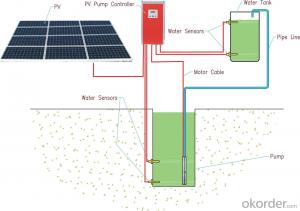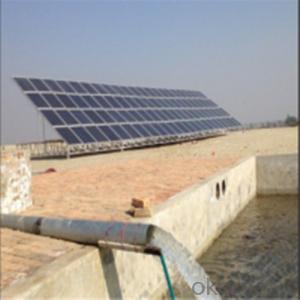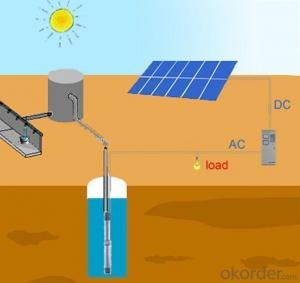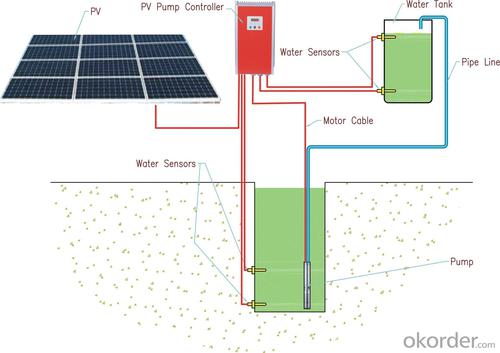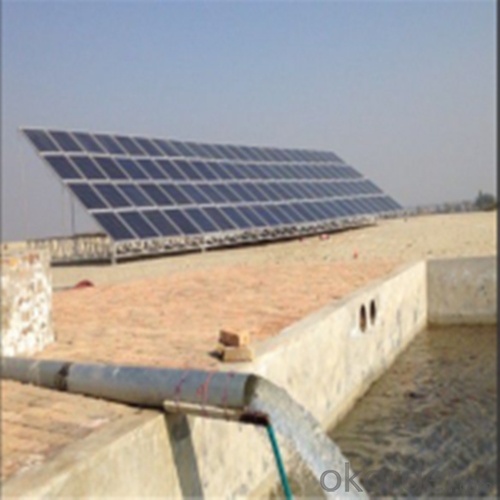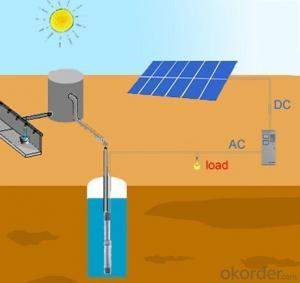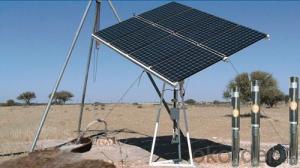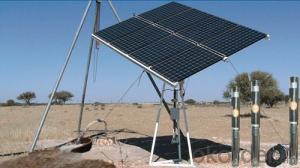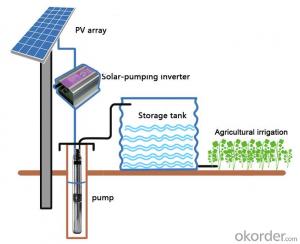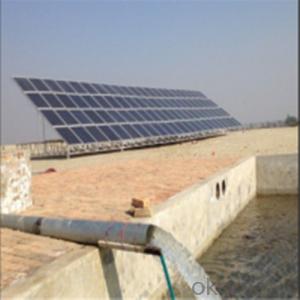Silicon Solar Pump - Battery Powered Water Pump Solar Panel Water Pumps
- Loading Port:
- Shanghai
- Payment Terms:
- TT OR LC
- Min Order Qty:
- 1 set
- Supply Capability:
- 1000 set/month
OKorder Service Pledge
OKorder Financial Service
You Might Also Like
Battery Powered Water Pump Solar Panel Water Pumps
Advanced Technology
Applications Innovation
The efficiency of DC brushless permanent magnet motor has been increased up to 25% in comparison with traditional asynchronous motor.
Technology Innovation
Stator and rotor are sealed by environment friendly casting resin.Motor insulation resistance can be hold higher than 300MΩfor more than 10 years, which consumedly increased the security and reliability of the submersible motor.
Structure Innovation
Casting resign technology processed stator and rotor as well as the water lubricated bearing make the submersible pump environment friendly.
Feature
High Efficiency & High Reliability
DC Brushless Permanent Magnet Motor
Minimum Maintenance, long Service Life
Environment Friendly Materials, Lubricated Without Oil
Automatic Control
Operate Automatically, No Need Watching
Maximum Power Point Tracking (MPPT)
Dry-run Protection
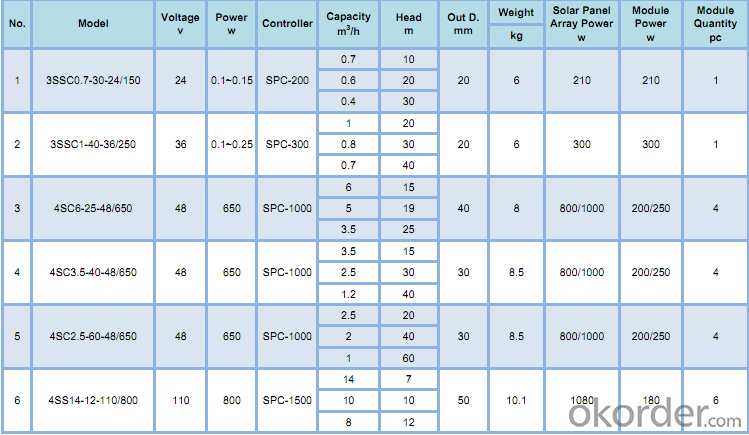
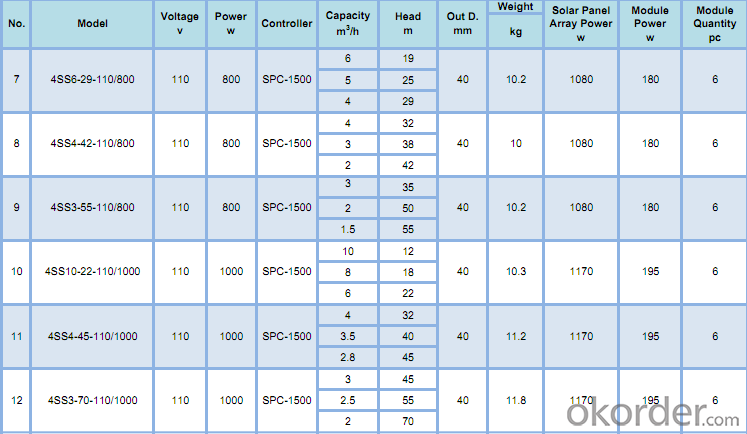
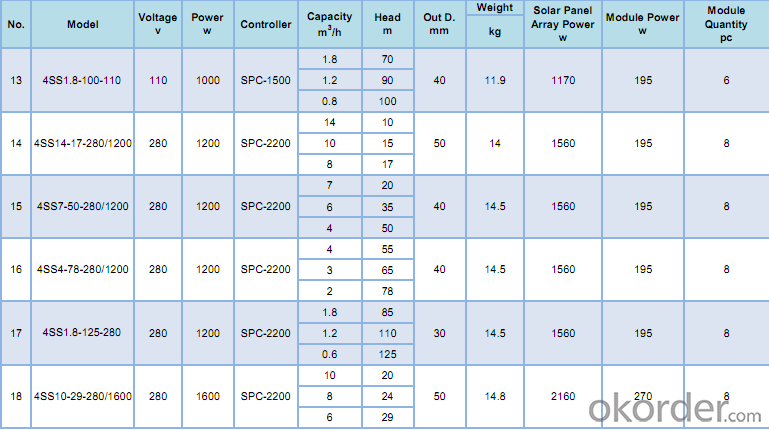
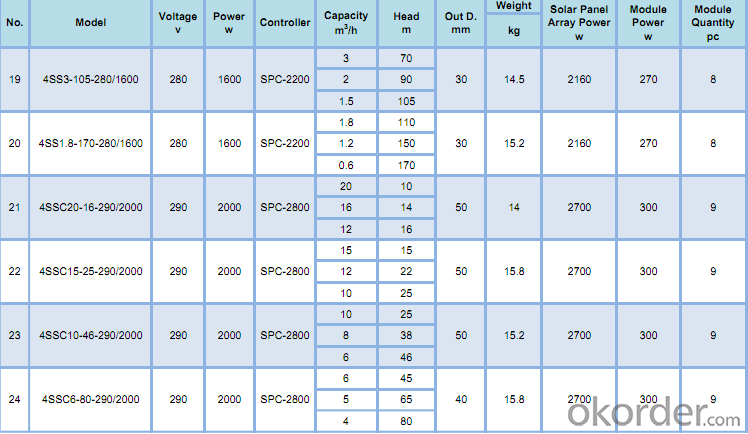
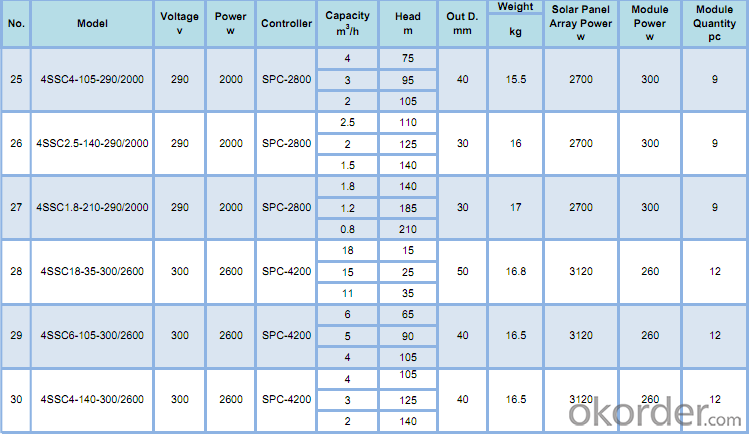
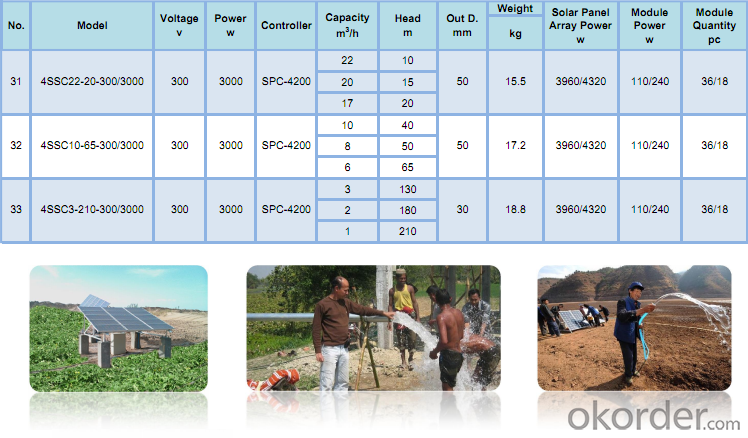
- Q: Can a solar pump be used for water supply in disaster-stricken areas?
- Yes, a solar pump can be used for water supply in disaster-stricken areas. Solar pumps are a reliable and sustainable solution for providing access to water in areas where traditional power sources may be disrupted or unavailable. These pumps are powered by solar energy and do not require fuel or electricity, making them cost-effective and environmentally friendly. In disaster-stricken areas, access to clean water is often a critical need. Solar pumps can be used to extract water from wells, boreholes, or other water sources, and to distribute it to communities for drinking, irrigation, or other purposes. They can be easily installed and operated, requiring minimal maintenance and no ongoing fuel costs. Furthermore, solar pumps can be equipped with storage systems, allowing water to be collected and stored during daylight hours for use during the night or during overcast days. This ensures a continuous and reliable water supply, even in challenging conditions. Additionally, solar pumps can be integrated with water purification systems to provide clean and safe drinking water in disaster-stricken areas where water sources may be contaminated. This combination of solar pumping and water purification can greatly improve the overall water supply situation and help prevent the spread of waterborne diseases. Overall, solar pumps offer a practical and sustainable solution for water supply in disaster-stricken areas. They provide a reliable source of water without the need for conventional power sources, making them an ideal choice for ensuring access to clean water in emergency situations.
- Q: How does the quality of the solar panels affect the performance of a solar pump system?
- The performance of a solar pump system greatly depends on the quality of the solar panels. Solar panels of high quality are designed to efficiently convert sunlight into electricity, resulting in maximum power output. When the solar panels are of good quality, they are able to capture solar energy more effectively, leading to higher electricity production. As a result, a solar pump system with high-quality panels can generate more power, meeting the water pumping requirements and providing a greater amount of energy. On the other hand, low-quality solar panels may have lower conversion efficiency, resulting in reduced power generation. This directly affects the performance of the solar pump system as the lower power output may not be enough to operate the pump effectively or meet the desired water pumping needs. Additionally, it is important to consider the durability and reliability of the solar panels. High-quality panels are made with superior materials and can withstand harsh weather conditions and environmental factors. They have a longer lifespan and consistently perform well. In contrast, low-quality panels are more prone to damage and degradation, leading to decreased power output and a shorter lifespan. Furthermore, the quality of solar panels also impacts the overall system efficiency and maintenance requirements. High-quality panels often have advanced features such as anti-reflective coatings and self-cleaning mechanisms. These features enhance energy absorption and reduce the accumulation of dust and dirt. As a result, the panels operate at their maximum efficiency and require less frequent cleaning and maintenance. In conclusion, investing in high-quality solar panels is crucial to optimize the performance of a solar pump system. It ensures maximum power output, durability, and reliability, leading to efficient water pumping operations and long-term cost savings.
- Q: Can a solar pump be used for water supply in vineyards?
- Yes, a solar pump can be used for water supply in vineyards. Solar pumps are an environmentally friendly and cost-effective solution for providing water to vineyards. They harness solar energy to power the pump, eliminating the need for electricity or fuel. This makes them an ideal option for remote or off-grid vineyards. Additionally, solar pumps can provide a reliable and consistent water supply, ensuring optimal vineyard irrigation and promoting healthy growth of the vines.
- Q: How does a solar pump handle water source pollution from agricultural activities?
- A solar pump does not directly handle water source pollution from agricultural activities. However, it can indirectly contribute to reducing pollution by promoting sustainable irrigation practices. By providing a clean and renewable energy source for pumping water, solar pumps can help minimize the use of diesel or electric pumps that may contribute to pollution through emissions. Additionally, solar pumps can facilitate the adoption of efficient irrigation techniques, such as drip irrigation, which reduces water usage and minimizes the leaching of fertilizers and pesticides into water sources.
- Q: What is the payback period for a solar pump system?
- The payback period of a solar pump system can vary based on several factors, including the initial cost, energy savings, and local electricity rates. Typically, the payback period falls within the range of 3 to 8 years. In other words, it takes between 3 to 8 years for the energy cost savings to equal the initial investment. However, it is worth noting that the lifespan of a solar pump system can be 20 to 30 years. Therefore, even after the payback period, the system continues to offer significant energy cost savings. Furthermore, considering the potential rise in electricity rates over time, the payback period may potentially be shorter. To sum up, investing in a solar pump system can yield a relatively quick payback period and long-term financial advantages.
- Q: Can a solar pump be used for irrigation in saline soils?
- Yes, a solar pump can be used for irrigation in saline soils. However, certain considerations need to be taken into account. Saline soils can affect the efficiency and lifespan of the pump, as well as the quality of water being pumped. It is important to select a solar pump that is specifically designed to handle saline water and has appropriate filtration systems. Additionally, regular maintenance and monitoring of the pump's performance are crucial to ensure its optimal functioning in saline soil conditions.
- Q: How does a solar pump handle water with high levels of chlorine or other disinfectants?
- A solar pump does not directly handle or treat water with high levels of chlorine or other disinfectants. The primary function of a solar pump is to draw water from a source, such as a well or a reservoir, and transfer it to a desired location using solar energy. If the water being pumped contains high levels of chlorine or disinfectants, it is advisable to treat the water before it enters the solar pump system to ensure proper functioning and longevity of the equipment.
- Q: Are solar pumps suitable for use in construction sites?
- Yes, solar pumps are suitable for use in construction sites. They are highly efficient, cost-effective, and environmentally friendly alternatives to traditional fuel-powered pumps. Solar pumps can provide a reliable water supply for various construction activities such as concrete mixing, dust suppression, and irrigation. Additionally, they can be easily installed and require minimal maintenance, making them an ideal choice for construction sites in remote or off-grid locations.
- Q: How does a solar pump handle water source contamination from nuclear power plants?
- A solar pump does not directly handle water source contamination from nuclear power plants. The purpose of a solar pump is to utilize solar energy to pump water from a source to a desired location, such as for irrigation or drinking water supply. However, if the water source is contaminated due to nuclear power plant activities, it would require appropriate water treatment systems or other mitigation measures to address the contamination issue separately from the solar pump system.
- Q: How does a solar pump handle water with high levels of nitrates or other contaminants?
- A solar pump does not have the capability to handle water with high levels of nitrates or other contaminants. It is primarily designed to pump water for irrigation or drinking purposes, and it does not have built-in filtration or purification systems. In such cases, additional water treatment methods like reverse osmosis or activated carbon filters may be required to remove contaminants before using the water pumped by a solar pump.
Send your message to us
Silicon Solar Pump - Battery Powered Water Pump Solar Panel Water Pumps
- Loading Port:
- Shanghai
- Payment Terms:
- TT OR LC
- Min Order Qty:
- 1 set
- Supply Capability:
- 1000 set/month
OKorder Service Pledge
OKorder Financial Service
Similar products
Hot products
Hot Searches
Related keywords
